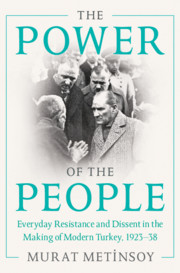Book contents
- The Power of the People
- Maps
- The Power of the People
- Copyright page
- Contents
- Figures
- Acknowledgments
- Introduction
- Part I Everyday Politics of Peasants
- Part II Everyday Politics of Urban Labor
- Part III The Power of Popular Culture
- 10 Hotbeds of Opposition to Secularism
- 11 Informal Media vs. Official Discourse
- 12 Neither Fez Nor Hat
- 13 Negotiating Anti-veiling Campaigns
- 14 Old Habits Die Hard
- Concluding Remarks
- Epilogue
- Notes
- Bibliography
- Index
Concluding Remarks
from Part III - The Power of Popular Culture
Published online by Cambridge University Press: 24 December 2021
- The Power of the People
- Maps
- The Power of the People
- Copyright page
- Contents
- Figures
- Acknowledgments
- Introduction
- Part I Everyday Politics of Peasants
- Part II Everyday Politics of Urban Labor
- Part III The Power of Popular Culture
- 10 Hotbeds of Opposition to Secularism
- 11 Informal Media vs. Official Discourse
- 12 Neither Fez Nor Hat
- 13 Negotiating Anti-veiling Campaigns
- 14 Old Habits Die Hard
- Concluding Remarks
- Epilogue
- Notes
- Bibliography
- Index
Summary
The secularizing reforms of Turkey undoubtedly comprised one of the most comprehensive cultural reconstruction processes in world history. Both nationalist-secularist and critical accounts portray them as uncontested, uncompromising and top-down imposition. The role of Atatürk and republican intellectuals also cannot be denied. Partially for this reason, the literature about this period abounds with studies focusing primarily on the republican rulers, their ideological and political agenda and their legal and administrative changes. Owing to the splendor of the republic’s reforms, the implementation of the policies and people’s complex daily interactions with them have been generally underestimated. The projection of the later political rivalry between the RPP and the conservative-right parties in the historiography has reduced everything that happened during the early republic to a clash between secularism and religion. Works on opposition and protest tend to consider a few open uprisings and intellectual opposition as forms of resistance motivated solely by religious sentiments. Political Islamism especially enjoyed amplifying how Muslims and Islam were suppressed in this period.
- Type
- Chapter
- Information
- The Power of the PeopleEveryday Resistance and Dissent in the Making of Modern Turkey, 1923-38, pp. 282 - 285Publisher: Cambridge University PressPrint publication year: 2021

